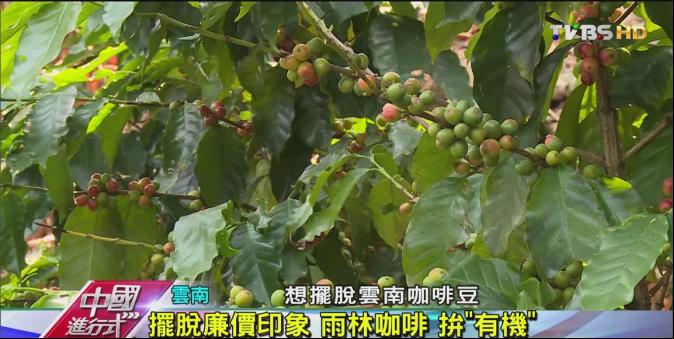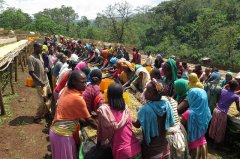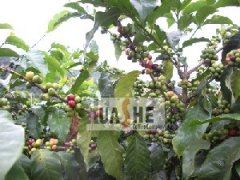[Yunnan Coffee, China] 1 kg 13000! Probe into Yunnan "Rainforest Coffee"

For professional baristas, please follow the coffee workshop (Wechat official account cafe_style)
90% of China's coffee production is in Yunnan, and Starbucks and Nestl é have set up factories to buy cheap coffee beans. But this stereotype has been broken this year. Yunnan's top coffee sells for tens of thousands of Taiwan dollars per kilogram, and it is necessary to counterattack with "boutique coffee." Huang Xinghua and Li Weihua told us.
◎ is unwilling to do "instant" Yunnan coffee beans fight high-end!
Hundreds of kilograms of fresh fruit are even more glowing in the bright sun of Pu'er. Mountain springs are washed and washed, looking forward to seed transformation and becoming high-priced boutique coffee beans.
Bai Yingfu, director of Manzhongtian Coffee Manor in Yunnan Province, said: "the good ones sink in the back, and the light defective beans are gone."
Yellow-brown coffee beans, washed and fermented to remove pectin from the peel.
◎ is not just tea! 50% of Lu Arabica beans are produced from Pu'er.
From October to March, coffee farmers of the Bai nationality picked up their rakes and sorted them over and over again. Because of the warmth of the sun, Pu'er is not only famous for its tea, but the Arabica coffee beans account for more than half of the mainland's output, but no one knows it hidden in the mountains.
Mainland coffee is the same: "one more, one more. Is this a wave?"
Zhu Zhihong, general manager of Everman Nakata Coffee: "look at the trail, we are all shuttling through the forest."
Sichuan coffee shop operator: "very crazy and excited."
Planting trees and shading in ◎ Valley to explore the delicate "Rainforest Coffee"
Yellow sand all the way to the rainforest coffee garden is not enough, you have to follow the hillside, step by step into the valley.
Zhu Zhihong, general manager of Everman Nakata Coffee: "Rainforest coffee cannot be completely exposed to the sun, which will affect the quality of this coffee and should have a certain degree of shielding."
TVBS reporter Huang Xinghua: "at an altitude of 1500 meters, we are now 70 kilometers away from Pu'er City District in the mountains. Here we see very precious rainforest coffee trees. These rainforest coffee trees grow in the rainforest and produce coffee beans of nearly NT $1,000 per kilogram. This is an opportunity for Poole to turn to boutique coffee."
Zhu Zhihong, general manager of Everman Nakata Coffee: "it has a fragrant taste, which becomes coffee beans."
◎ to get rid of the impression of cheap! Rainforest coffee spells "organic"
Growing coffee in the rainforest means that there is no way to mechanize, and natural farming methods do not sprinkle pesticides. These are all high costs, and the calculation behind them is the "rainforest coffee brand." they want to get rid of the impression that Yunnan coffee beans are cheap.
Zhang Xi, Yunnan Coffee Trading Center: "because Pu'er coffee does not have a brand in the world, after going abroad, bulk buyers need to make strong demands, but they have to reduce the futures price."
Bean factory worker: "50 kilograms (a pack), 20 tons a day."
60% of the local raw beans were purchased by Starbucks Nestle and other big companies. On the day of the interview, the price of beans was 13 yuan per kilogram. Mainland consumers in chain brands have to spend at least 160 yuan per kilogram, which is the added value created by foreign brands.
◎, aim for Blue Mountain! The Coffee Office of Pu'er strives to create a brand.
Lu Han, director of Yunnan Pu'er Coffee Office, said: "if Pu'er coffee is not marked as Pu'er coffee, if Pu'er coffee is as famous as Pu'er tea, if Pu'er is as famous as Blue Mountain coffee, and everyone is proud to drink this coffee, will it still be resold?" It will sell for a certain value. "
The price is undervalued, from the origin to the consumer side, the biggest profit is earned by foreign investors, of course, the local people are not reconciled.
◎ spells high-end image! The "champion bean" of Pu'er sold in 13000.
Tedlinger, president of the American Fine Coffee Association: "it's perfect. Let's get started."
Foreign experts are invited to smell and taste with their tongues. The cup tasting meeting is not enough. They set up their own auction center. The first auction of champion coffee beans in 2015 sold for 2600 yuan per kilogram, equivalent to about NT $13, 000.
◎ fight for economy for a change! Coffee fever in the tea capital of Pu'er
Lu Han, director of Yunnan Pu'er Coffee Office, said: "Chinese people drink two to three cups of coffee a year, Japanese drink two to three cups a day, and the number is even larger in northern Europe. China is expected to become a big consumer market after the United States."
TVBS reporter Huang Xinghua: "Coffee beans were produced in Pu'er 20 years ago, when they were cheap three-in-one coffee brewing powder, but now they appear on the streets of Pu'er, roasting coffee beans on the first floor, followed by a cup of coffee on the second floor."
1% coffee shop clerk vs. Customer: "introduce me to your love in Pu'er. In terms of color, taste and fragrance, it is sweet and a little sour."
Having a cup of coffee in Pu'er and enjoying the comfortable environment and decoration starts from about NT $100, which is about the same as in Taiwan, but most of the people who set up cafes in urban areas are outsiders who dream of coffee.
◎ sees that the "bean hunter" of the rainforest coffee table lives in Pu'er.
Jin Jihui, general manager of 1% Coffee: "I am a northerner. Sometimes I joke that I go from the North Pole to the South Pole, chasing a coffee in 8 years, a lifelong dream, a challenge, a courage, and I let it go down with the whirlpool."
Careful demonstration of siphon coffee, he is Jin Jihui, a native of Harbin, graduated from Beijing Film University, likes to drink coffee, so he stayed in Pu'er for 8 years.
Jin Jihui, a bean hunter from Taiwan, said: "the characteristics of Yunnan coffee beans tend to be sweeter and sweeter."
He cooperates with Taiwanese who come from across the sea to study baking technology, and they want to attack first-tier coastal cities with the taste of Pu'er coffee.
Jin Jihui, general manager of 1% Coffee: "this kind of hanging-ear follicular coffee can be enjoyed at any time after it is torn open, and enjoy a cup of black coffee. It is different from instant coffee."
The hanging-ear coffee allows white-collar workers to brew hot water for three minutes, a cup of Yunnan black coffee is refreshing, and the production line in Jin Jihui's factory is constantly in operation. after eight years of preparation, the first batch of single equivalent to NT $250 million, the colorful Yunnan ethnic minorities on the packaging, the packaging first focuses on the hotel tourism market.
Jin Jihui, general manager of 1% Coffee: "Nestl é has fast financing, Starbucks has its system chain, we live in our own way and go our own way and unconventional channels."
◎ has an annual output of 45000 tons! Pu'er Coffee creates a "boutique"
Lu Han, director of Yunnan Pu'er Coffee Office, said: "Pu'er is called the coffee capital of China. Our planting area is 716000 mm, with an annual output of 45000 tons, which accounts for half of China's total."
According to the estimation of the International Coffee Organization, although the output of Pu'er coffee accounts for less than 1% of the world, it is already more than half of that of the mainland. Under the attack of Nestl é and Starbucks, it gives up cheap mass production, seeks boutique brands, and earns black gold in coffee after 20 years of backwardness.
Important Notice :
前街咖啡 FrontStreet Coffee has moved to new addredd:
FrontStreet Coffee Address: 315,Donghua East Road,GuangZhou
Tel:020 38364473
- Prev

Flavor characteristics of coffee beans from Yega Xuefei area introduction to Ethiopian Yega Xuefei Coffee
For the exchange of professional baristas, please follow the coffee workshop (Wechat official account cafe_style) there are two producing areas on the whole world coffee map, no matter how many bakeries offer us, one is Poquet in Panama, the other is Cochel in Yegashefi, Ethiopia! This Cole Kore
- Next

High-quality beans from Yunnan coffee producing areas-- Pu'er Coffee how about Yunnan Coffee in China?
For the exchange of professional baristas, please follow the coffee workshop (Wechat official account cafe_style). Yunnan Coffee is the main and largest coffee producing area in China. At present, Yunnan coffee producing areas are mainly distributed in Simao, Banna, Wenshan, Baoshan, Dehong and other areas in the south and southwest of Yunnan. Huangsheng Coffee Co., Ltd. imports main coffee producing areas in Yunnan
Related
- Detailed explanation of Jadeite planting Land in Panamanian Jadeite Manor introduction to the grading system of Jadeite competitive bidding, Red bid, Green bid and Rose Summer
- Story of Coffee planting in Brenka region of Costa Rica Stonehenge Manor anaerobic heavy honey treatment of flavor mouth
- What's on the barrel of Blue Mountain Coffee beans?
- Can American coffee also pull flowers? How to use hot American style to pull out a good-looking pattern?
- Can you make a cold extract with coffee beans? What is the right proportion for cold-extracted coffee formula?
- Indonesian PWN Gold Mandrine Coffee Origin Features Flavor How to Chong? Mandolin coffee is American.
- A brief introduction to the flavor characteristics of Brazilian yellow bourbon coffee beans
- What is the effect of different water quality on the flavor of cold-extracted coffee? What kind of water is best for brewing coffee?
- Why do you think of Rose Summer whenever you mention Panamanian coffee?
- Introduction to the characteristics of authentic blue mountain coffee bean producing areas? What is the CIB Coffee Authority in Jamaica?

